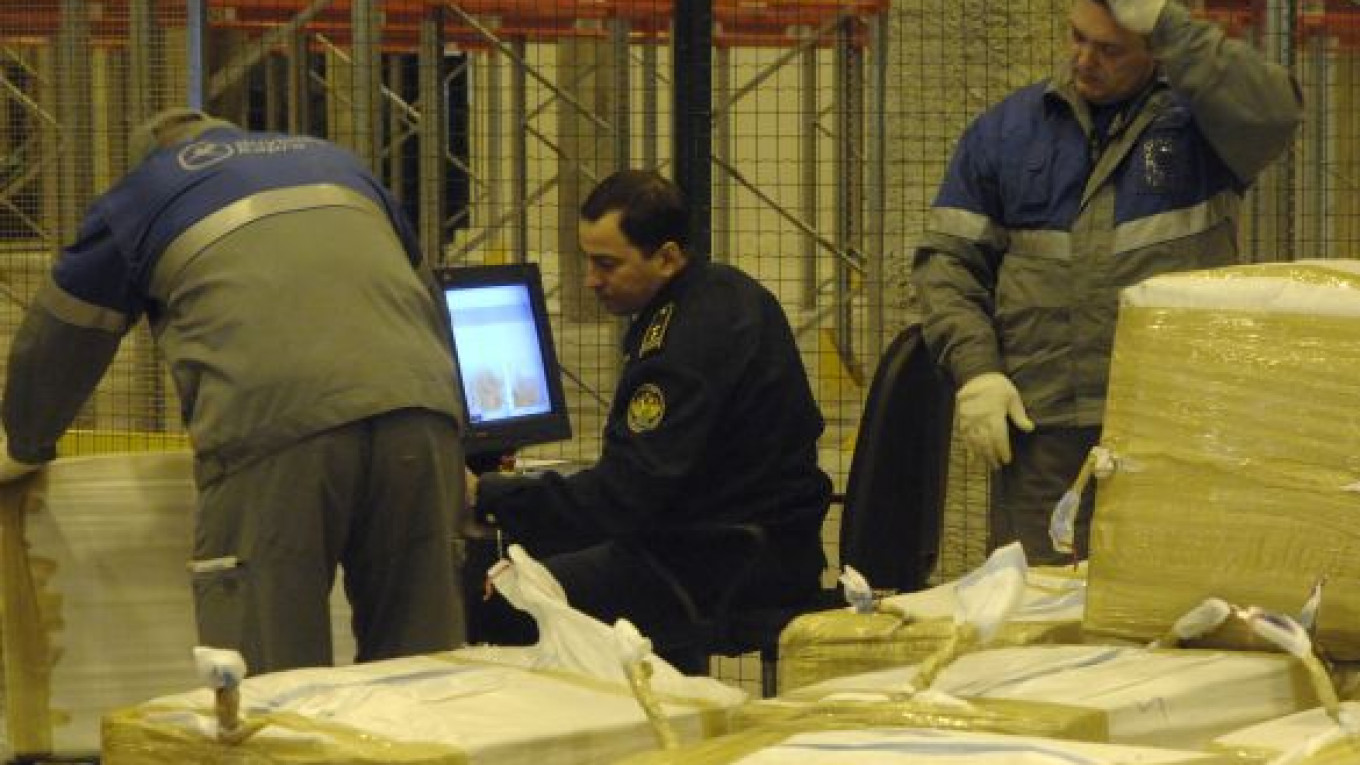The thought of having to deal with Russian customs officials is scaring potential investors away from the country, President Dmitry Medvedev told government officials, and the situation on the border has only worsened in the past half year.
Customs administration was the main topic during a meeting Medvedev held Monday in Sochi on the country's investment climate.
Expenses related to customs procedures are often unpredictable, and both domestic and foreign businesses — including potential exporters of high-tech goods — face problems at the border, Medvedev said, according to comments carried on the Kremlin web site.
Lengthy delays and expensive customs requirements, as well as difficulties moving goods and capital across the border, are causing Russia to fall behind in the battle to attract investment, he said.
Russia's customs procedures are ranked near the bottom globally for ease of use, Economic Development Minister Elvira Nabiullina conceded during the meeting. About 44 percent of shipments are inspected in Russia, whereas in the United States and Germany no more than 3 percent are checked, and in Britain just 2 percent of packages are inspected, she said, Interfax reported.
Companies must provide an average of eight documents to export goods from Russia and 13 to import, or roughly twice what is required in developed countries, she said, adding that the unnecessary procedures extend customs processing by about five days. Kazakhstan and Belarus, Russia's partners in its new customs union, have more efficient procedures, Nabiullina said.
Medvedev ordered a reduction in the number of outdated customs regulations, the creation of a "green channel" for high-tech goods and an analysis of the influence of customs on falling trade volumes and business activity.
Surveys of entrepreneurs seem to show that attitudes toward Russia's customs service are worsening. In November 2009, respondents more often called customs operations efficient, whereas in May there were an equal number of executives with positive and negative feelings about the customs service, according to the Delovaya Rossia business lobby, which surveyed 600 to 700 senior executives.
Entrepreneurs named customs oversight as the No. 1 obstacle preventing big business from doing innovative work, according to a recent report by PricewaterhouseCoopers and the New Economic School.
The poorly operating customs service is one of the main barriers to business in Russia, Delovaya Rossia head Boris Titov said. Customs officials are worried only about following bureaucratic formalities, not the possible costs they are inflicting on business, he said.
As an example, Titov cited a legislative change earlier this year that completely halted all imports of outboard motors for five months.
Russia's customs procedures are worse than those of its partners in the customs union, said Anton Guskov, a spokesman for RATEK, an association of Russian electronics and computer retailers and producers.
In Belarus and Kazakhstan, customs policies are meant to stimulate honest foreign trade, he said. Direct importers or producers may bring in goods through a "green channel," electronic declarations are used and inspections are conducted after goods have passed through customs and into the country.
In Kazakhstan, not a single decision is made without some dialogue with business, whereas entrepreneurs are treated like potential smugglers in Russia, Guskov said.
To create a computer's motherboard, for example, hundreds of individual components must be imported, each of which requires separate customs processing, Russian Venture Company chief Igor Agamirzyan has told Vedomosti. As a result, it is simpler to import a finished motherboard than to assemble it in Russia, he said.
Like in other countries, much depends on customs officials' discretion, which is why it is important to change their mentality, said Pepeliaev Group's Galina Balandina, a former director of the Economic Development Ministry's state trade regulation department.
As long as the customs service is primarily judged on how much revenue it generates for the budget, officials will have a vested interest in checking shipments as often as possible, Balandina said. To change the situation, customs posts need to be graded on processing times and the costs they create for business, she said.
If the gap with Belarus and Kazakhstan continues, many Russian companies involved in foreign trade could move their production to the neighboring countries, Balandina warned.
Spokespeople for the Federal Customs Service and the Economic Development Ministry declined to comment.
A Message from The Moscow Times:
Dear readers,
We are facing unprecedented challenges. Russia's Prosecutor General's Office has designated The Moscow Times as an "undesirable" organization, criminalizing our work and putting our staff at risk of prosecution. This follows our earlier unjust labeling as a "foreign agent."
These actions are direct attempts to silence independent journalism in Russia. The authorities claim our work "discredits the decisions of the Russian leadership." We see things differently: we strive to provide accurate, unbiased reporting on Russia.
We, the journalists of The Moscow Times, refuse to be silenced. But to continue our work, we need your help.
Your support, no matter how small, makes a world of difference. If you can, please support us monthly starting from just $2. It's quick to set up, and every contribution makes a significant impact.
By supporting The Moscow Times, you're defending open, independent journalism in the face of repression. Thank you for standing with us.
Remind me later.







